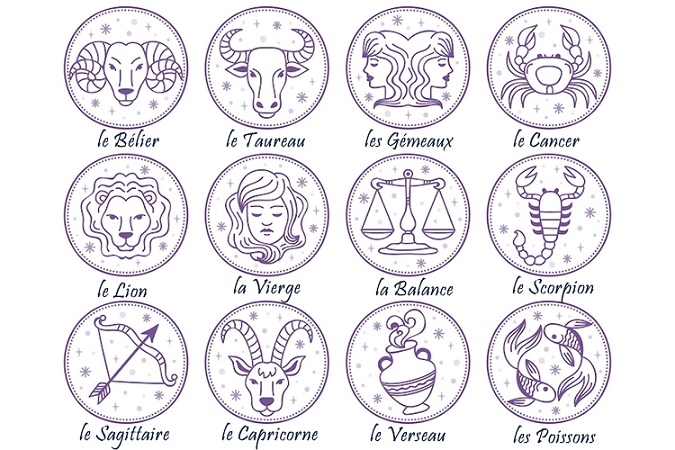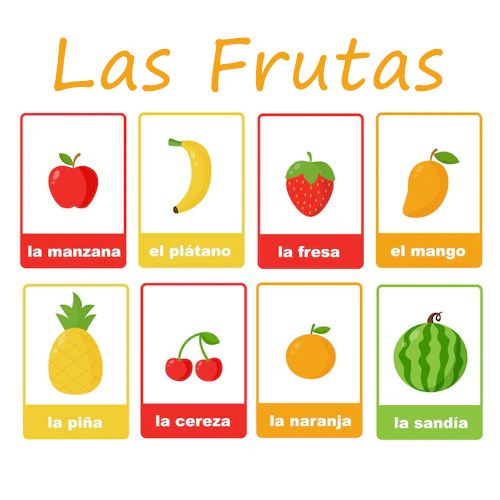Islamic Months of the Year
Month’s Name According to Islamic Calendar In this lesson, we will learn about Islamic Months of the year in Arabic …

Be The Topper….!!!
Be The Topper….!!!

Seasons in French Les saisons : In this lesson, we will learn about the seasons in French Language. Learn How …

Zodiac / Star Signs in French zodiac signs in French are called signes du zodiaque. Just like other language French …
Zodiac Signs in German zodiac signs in German Language : Star Signs are translated as Sternzeichen. There are 12 starsigns …

20 Fruits in Spanish Language 20 Fruits Name in Spanish : frutas nombre en español: In this lesson, we …
In this lesson, we will learn about Islamic Months of the year in Arabic Language. In Islam the calendar starts with Muharram and ends with Dhu al-Hijjah. Muharram is the first month of the year and Dhu al-Hijjah is the last month of the year. In islaam we have only 360 days in a month while the English calendar have 365 or 366 days. So, every year the month shift 10 days earlier. Ramadan is the holy month in which muslim keep fast through out the month and at the beginning of Shawwal Month Eid is celebrated.
| Arabic Name | Arabic Pronunciation | English | Hindi |
| مُحَرَّم | Muharram | First | मुहर्रम |
| صَفَر | Safar | Second | सफ़र |
| رَبِيع ٱلْأَوَّل | Rabi’ al-Awwal | Third | रबी अल-अव्वल |
| رَبِيع ٱلثَّانِي | Rabi’ al-Thani | Forth | रबी अल-थानी |
| جُمَادَىٰ ٱلْأُولَىٰ | Jumada al-Awwal | Fifth | जुमादा अल-अव्वल |
| جُمَادَىٰ ٱلثَّانِيَة | Jumada al-Thani | Sixth | जुमादा अल-थानी |
| رَجَب | Rajab | Seventh | रजब |
| شَعْبَان | Sha’ban | Eighth | शबान |
| رَمَضَان | Ramadan | Ninth | रमजान |
| شَوَّال | Shawwal | Tenth | शावाल |
| ذُو ٱلْقَعْدَة | Dhu al-Qi’dah | Eleventh | ज़ू अल-क़िदा |
| ذُو ٱلْحِجَّة | Dhu al-Hijjah | Twelfth | ज़ू अल-हिज्जाह |

In this lesson, we will learn about Days of Week in Arabic Language. Day is translated as “Yaum” in Arabic Language. Days in Arabic are based on counting as first day is called Al-Ahad. Ahad means one i.e First day of the week. Same rule apply on all days except Friday, Friday is called Juma same like urdu language. Everyone knows there are seven days in a week. Learn how to say Monday, Tuesday, Wednesday, Thursday, Friday, Saturday, Sunday in Arabic Language.
| Arabic Name | Arabic Pronunciation | English | Hindi |
| الأحد | (al-ahad) | Sunday | रविवार |
| الإثنين | (al-ithnayn) | Monday | सोमवार |
| الثلاثاء | (al-thulatha) | Tuesday | मंगलवार |
| الأربعاء | (al-arba’a) | Wednesday | बुधवार |
| الخميس | (al-khamees) | Thursday | गुरूवार |
| الجمعة | (al-juma’a) | Friday | शुक्रवार |
| السبت | (as-sabt) | Saturday | शनिवार |
Hello, Welcome you all, Today is our first lesson about the most common greetings in Arabic Language. In this article I have covered most common greeting in Arabic with correct pronunciation with English Translation. So lets start the new journey to learn arabic.
| Arabic | Arabic Pronunciation | English |
|---|---|---|
| مرحباً | (Marhaban) | Hello |
| صباح الخير | (Sabah al-khayr) | Good morning |
| مساء الخير | (Masa’ al-khayr) | Good evening |
| كيف حالك؟ | (Kayfa haluka?) | How are you? (to a male) |
| كيف حالك؟ | (Kayfa haluki?) | How are you? (to a female) |
| أهلاً وسهلاً | (Ahlan wa sahlan) | Welcome |
| السلام عليكم | (As-salamu alaykum) | Peace be upon you (greeting) |
| وعليكم السلام | (Wa alaykum as-salam) | And upon you be peace (response to the greeting) |
| مبروك | (Mabrook) | Congratulations |
| شكراً | (Shukran) | Thank you |
| عفواً | (Afwan) | You’re welcome |
| إلى اللقاء | (Ila al-liqaa) | Goodbye |
| أتمنى لك يوماً سعيداً | (Atamanna lak yawman sa’idan) | Have a nice day |
| أسف | (Asif) | Sorry |
| أنا آسف | (Ana asif) | I’m sorry |
| حظاً سعيداً | (Hazaan sa’eedan) | Good luck |
| عيد مبارك | (Eid Mubarak) | Blessed holiday (used during Islamic holidays) |
| رمضان كريم | (Ramadan Kareem) | Generous Ramadan (greeting during Ramadan) |
| أتمنى لك التوفيق | (Atamanna lak at-tawfiq) | I wish you success |
| أتمنى لك يوماً جميلاً | (Atamanna lak yawman jameelan) | I wish you a beautiful day |
Arabic, one of the world’s oldest and most widely spoken languages, offers a plethora of benefits for individuals keen on expanding their linguistic skills and cultural horizons. Whether for personal enrichment, professional advancement, or fostering intercultural understanding, learning Arabic opens doors to a range of opportunities and experiences.
1. Access to Rich Cultural Heritage
Arabic is deeply intertwined with the cultural heritage of the Middle East and North Africa, regions renowned for their historical significance, architectural marvels, and artistic achievements. By learning Arabic, individuals gain access to a treasure trove of literature, poetry, music, and traditions that span centuries, enriching their understanding of the diverse cultures that shape the Arab world.
2. Professional Opportunities
In an increasingly globalized world, proficiency in Arabic can provide a competitive edge in various professional fields. Industries such as international business, diplomacy, journalism, translation, and academia value individuals who can communicate fluently in Arabic, facilitating collaboration, negotiation, and market expansion in Arabic-speaking countries.
3. Enhanced Communication Skills
Learning Arabic not only broadens linguistic capabilities but also enhances communication skills overall. Arabic’s complex grammatical structure and diverse vocabulary challenge learners to think critically and express ideas with precision, fostering cognitive development and linguistic adaptability.
4. Greater Understanding of Islam and Islamic Culture
Arabic is the language of the Quran, Islam’s holy book, and a significant portion of the world’s Muslim population. By learning Arabic, individuals gain deeper insights into Islamic teachings, rituals, and cultural practices, fostering interfaith dialogue, mutual respect, and cross-cultural appreciation.
5. Travel and Cultural Immersion
Arabic proficiency opens doors to immersive travel experiences in Arabic-speaking countries, where travelers can engage with locals, navigate cultural nuances, and explore hidden gems off the beaten path. Learning Arabic phrases and expressions enhances the travel experience, allowing individuals to connect with people from diverse backgrounds and forge meaningful connections.
6. Academic and Research Opportunities
Arabic is a language of scholarship and intellectual inquiry, with a rich tradition of academic discourse in fields such as literature, history, philosophy, and religious studies. Proficiency in Arabic enables access to primary sources, research materials, and academic networks, facilitating original research and cross-cultural dialogue in various disciplines.
7. Personal Enrichment and Cultural Exchange
Beyond practical benefits, learning Arabic fosters personal growth, empathy, and cultural sensitivity. Engaging with Arabic-speaking communities exposes learners to different worldviews, traditions, and perspectives, fostering empathy, tolerance, and mutual understanding in an increasingly interconnected global society.
In conclusion, the benefits of learning Arabic extend far beyond linguistic proficiency, encompassing cultural enrichment, professional opportunities, and personal growth. Whether driven by curiosity, career aspirations, or a desire for intercultural exchange, embarking on the journey of learning Arabic promises a rewarding and transformative experience for individuals seeking to broaden their horizons and connect with the diverse cultures of the Arab world.
In this post you will learn about the zodiac signs or star signs in Italian Language. You can easily learn With English Translations.
| Italian | English | Hindi |
|---|---|---|
| Ariete | Aries | मेष (Mesh) |
| Toro | Taurus | वृष (Vrish) |
| Gemelli | Gemini | मिथुन (Mithun) |
| Cancro | Cancer | कर्कट (Karkat) |
| Leone | Leo | सिंह (Simha) |
| Vergine | Virgo | कन्या (Kanya) |
| Bilancia | Libra | तुला (Tula) |
| Scorpione | Scorpio | वृश्चिक (Vrishchik) |
| Sagittario | Sagittarius | धनु (Dhanu) |
| Capricorno | Capricorn | मकर (Makar) |
| Acquario | Aquarius | कुंभ (Kumbh) |
| Pesci | Pisces | मीन (Meen) |
In this lesson we will learn about the ordinal numbers in German. How to say ordinal numbers like First to Tenth.
| English | German | Hindi |
| First | erste | पहला |
| Second | zweite | दूसरा |
| Third | dritte | तीसरा |
| Fourth | vierte | चौथा |
| Fifth | fünfte | पांचवां |
| Sixth | sechste | छठा |
| Seventh | siebte | सातवां |
| Eighth | achte | आठवाँ |
| ninth | neunte | नौवां |
| Tenth | zehnte | दसवां |
| English | German | Hindi |
| Eleventh | elfte | ग्यारहवां |
| Twelfth | zwölfte | बारहवां |
| Thirteenth | dreizehnte | तेरहवां |
| Fourteenth | viertezehte | चौदहवां |
| Fifteenth | fünftezehte | पंद्रहवां |
| Sixteenth | sechzehnte | सोलहवां |
| Seventeenth | siebzehnte | सत्रहवाँ |
| Eighteenth | achtzehnte | अठारहवाँ |
| Nineteenth | neunzehnte | उन्नीसवां |
| Twentieth | zwanzigste | बीसवां |
Note: we have just added zehte after the numbers from 13th to 19th.
Like This Post, Follow Us on:
If you wanted to Learn German Course in Delhi. Call us Now +91-8383088783
In today’s globalized world, being multilingual is a significant advantage, and Spanish is one of the most widely spoken languages worldwide. Learning Spanish offers numerous benefits, from improved career prospects to personal growth and cultural enrichment. Here are some of the most notable benefits of learning Spanish:
In conclusion, learning Spanish can offer many benefits, from improved career prospects to personal growth and cultural enrichment. It is a language widely spoken in the world, and knowing it can open up new opportunities and broaden your horizons. Whether you want to travel, work, or connect with a broader community, learning Spanish can be an excellent investment for your personal and professional development.
Wanted to Learn Spanish course in Delhi
Follow us on Instagram : Toppersmind
Present Indefinite Affirmative Tense
Rule for He, She, it and Singular person: Subject+First Form of Verb+s/es+Object.
Rule for I,You, We, They and plurals: Subject+First Form of Verb+Object.
Example:
I am – Je suis
You are – Tu es
He is – ll est
She is – elle est
We are Nous sommes
You are – Vous etes
They are lls/ Elles sont
In French, personal pronouns are used to replace nouns, indicating the person speaking (first person), the person being spoken to (second person), or the person or thing being spoken about (third person). The personal pronouns in French are as follows:
1st person singular: je (I) 1st person plural: nous (we) 2nd person singular: tu (you, informal) 2nd person plural: vous (you, formal or plural) 3rd person singular: il (he), elle (she), on (one) 3rd person plural: ils (they, masculine), elles (they, feminine)
French personal pronouns also have different forms depending on their function in a sentence (subject, object, possessive adjective, reflexive pronoun)
In this lesson, we will learn about the professions or occupations in French language with Hindi and English Translations. Learn different professions name such as teacher, doctor, actor in French.
| English | French (mas.) | French (fem.) |
| Actor | acteur | actrice |
| Advocate | avocat | avocate |
| Agent | agent | agente |
| Architect | architecte | architecte |
| Artist | artiste | artiste |
| Baker | boulanger | boulangère |
| Banker | banquier | banquière |
| Broker | courtier | courtière |
| Cobbler | cordonnier | cordonnière |
| Dancer | danseur | danseuse |
| Dentist | dentiste | dentiste |
| Doctor | docteur | docteur |
| Detective | détective | détective |
| Engineer | Ingénieur | Ingénieure |
| Fireman | Pompier | Pompière |
| Gardner | Gardner | Gardner |
| Grocer | Épicier | Épicière |
| Hair Dresser | Coiffeur | Coiffeur |
| Judge | Juge | Juge |
| Journalist | Journaliste | Journaliste |
| Manager | Gestionnaire | Gestionnaire |
| Mechanic | Mécanicien | Mécanicienne |
| Nurse | Infirmier | Infirmière |
| Poet | poète | poétesse |
| Postman | facteur | factrice |
| Police | police | police |
| Politician | politicien | politicienne |
| Philosoper | philosophe | philosophe |
| Psychlogist | psychologue | psychologue |
| Plumber | Plombier | Plombière |
| Professor | Professeur | Professeure |
| Singer | chanteuse | chanteuse |
| Student | étudiant | étudiante |
35 Occupations in French
Les Professions
This video is covering most common Profession’s name in French langauge with English translation and correct pronunciations.
Q1. How to say Actor in French?
Ans. Actor is translated as “acteur” & “actrice”.
Q2. How to say Advocate in French?
Ans. Advocate is translated as “avocat” & “avocate”.
Q3. How to say Agent in French?
Ans. Agent is translated as “agent” & “agente”.
Q4. How to say Architect in French?
Ans. Architect is translated as “architecte.
Q5. How to say Artist in French?
Ans. Artist is translated as “artiste”.
Q6. How to say Baker in French?
Ans. Baker is translated as “boulanger” & “boulangère”.
Q7. How to say Banker in French?
Ans. Banker is translated as “banquier” & “banquière”.
Q8. How to say Broker in French?
Ans. Broker is translated as “courtier” & “courtière”.
Q9. How to say Dancer in French?
Ans. Dancer is translated as “danseur” & “danseuse”.
Q10. How to say Dentist in French?
Ans. Dentist is translated as “dentiste”.
Q11. How to say Docter in French?
Ans. Docter is translated as “docteur”.
Q12. How to say Detective in French?
Ans. Detective is translated as “détective”.
Like This Post, Follow Us on:
If you wanted to Learn French Course in Delhi. Call us Now +91-8383088783
Month’s Name According to Islamic Calendar In this lesson, we will learn about Islamic Months of the year in Arabic …
Can we help you find what you are looking for?